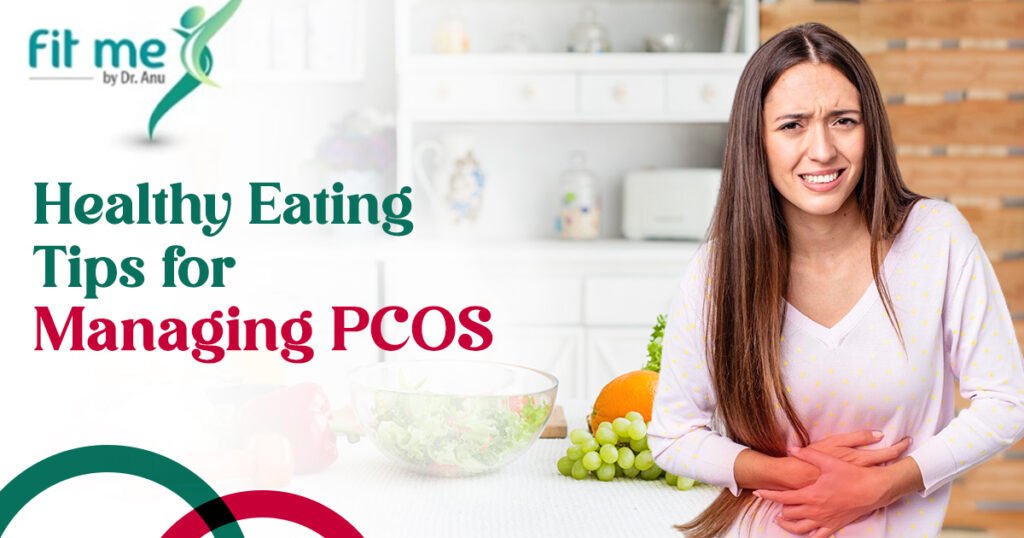
Polycystic Ovary Syndrome (PCOS) is a common hormonal disorder that affects many women of reproductive age. Managing PCOS involves a multifaceted approach, with diet playing a crucial role. Renowned PCOS doctor in Noida, Dr. Anu Goswami, emphasizes the importance of a balanced diet in managing the symptoms of PCOS. Here are some healthy eating tips to help manage PCOS effectively.
Prioritize a Balanced Diet
Dr. Anu Goswami advises that a balanced diet is the cornerstone of managing PCOS. Incorporating a variety of nutrient-dense foods can help regulate insulin levels and reduce inflammation. Focus on whole grains, lean proteins, healthy fats, and plenty of fruits and vegetables. Whole foods provide essential vitamins and minerals that support overall health and hormone balance.
Incorporate Low-Glycemic Index (GI) Foods
Foods with a low glycemic index are digested slowly, which helps maintain steady blood sugar levels. Dr Goswami suggests incorporating foods like oats, quinoa, sweet potatoes, and most fruits and vegetables. These foods can help reduce insulin spikes, which is crucial for women with PCOS as they are often insulin-resistant.
Opt for High-Fiber Foods
High-fiber foods can aid in weight management and improve insulin sensitivity. Foods rich in fibre, such as whole grains, legumes, fruits, and vegetables, can help you feel full longer and prevent overeating. Dr Anu Goswami recommends aiming for at least 25 grams of fibre per day to manage PCOS symptoms effectively.
Choose Healthy Fats
Healthy fats are essential for hormone production and overall health. Dr Goswami advises incorporating sources of healthy fats like avocados, nuts, seeds, and olive oil. Omega-3 fatty acids, found in fatty fish like salmon and chia seeds, are particularly beneficial for reducing inflammation associated with PCOS.
Limit Processed Foods and Sugars
Processed foods and added sugars can exacerbate PCOS symptoms by causing insulin spikes and increasing inflammation. Dr Goswami recommends minimizing the intake of sugary snacks, sodas, and refined carbohydrates. Instead, opt for natural sweeteners like honey or fruit, and choose whole foods over processed ones whenever possible.
Stay Hydrated
Proper hydration is crucial for overall health and can help manage PCOS symptoms. Dr Anu Goswami emphasizes the importance of drinking plenty of water throughout the day. Staying hydrated aids in digestion helps control hunger, and supports metabolic processes.
Monitor Portions and Eat Mindfully
Portion control and mindful eating can prevent overeating and help manage weight, which is often a concern for women with PCOS. Dr Goswami advises paying attention to hunger and fullness cues, eating slowly, and savouring each bite. This practice can lead to better digestion and more satisfaction with meals.
Consider Dietary Supplements
In some cases, dietary supplements can support the management of PCOS. Dr Anu Goswami suggests that supplements like inositol, vitamin D, and omega-3 fatty acids may be beneficial. However, it’s important to consult with a healthcare provider before starting any new supplements.
Conclusion
Managing PCOS effectively requires a holistic approach, with diet being a key component. By following these healthy eating tips from Dr Anu Goswami, a leading PCOS doctor in Noida, women can take proactive steps to manage their symptoms and improve their quality of life. Remember, individual needs may vary, so it’s always best to consult with a healthcare professional to create a personalized plan.
Starting a balanced diet, incorporating low-GI foods, choosing healthy fats, and staying hydrated are just a few ways to support your body and manage PCOS symptoms. By making these dietary changes, you can take control of your health and well-being.
